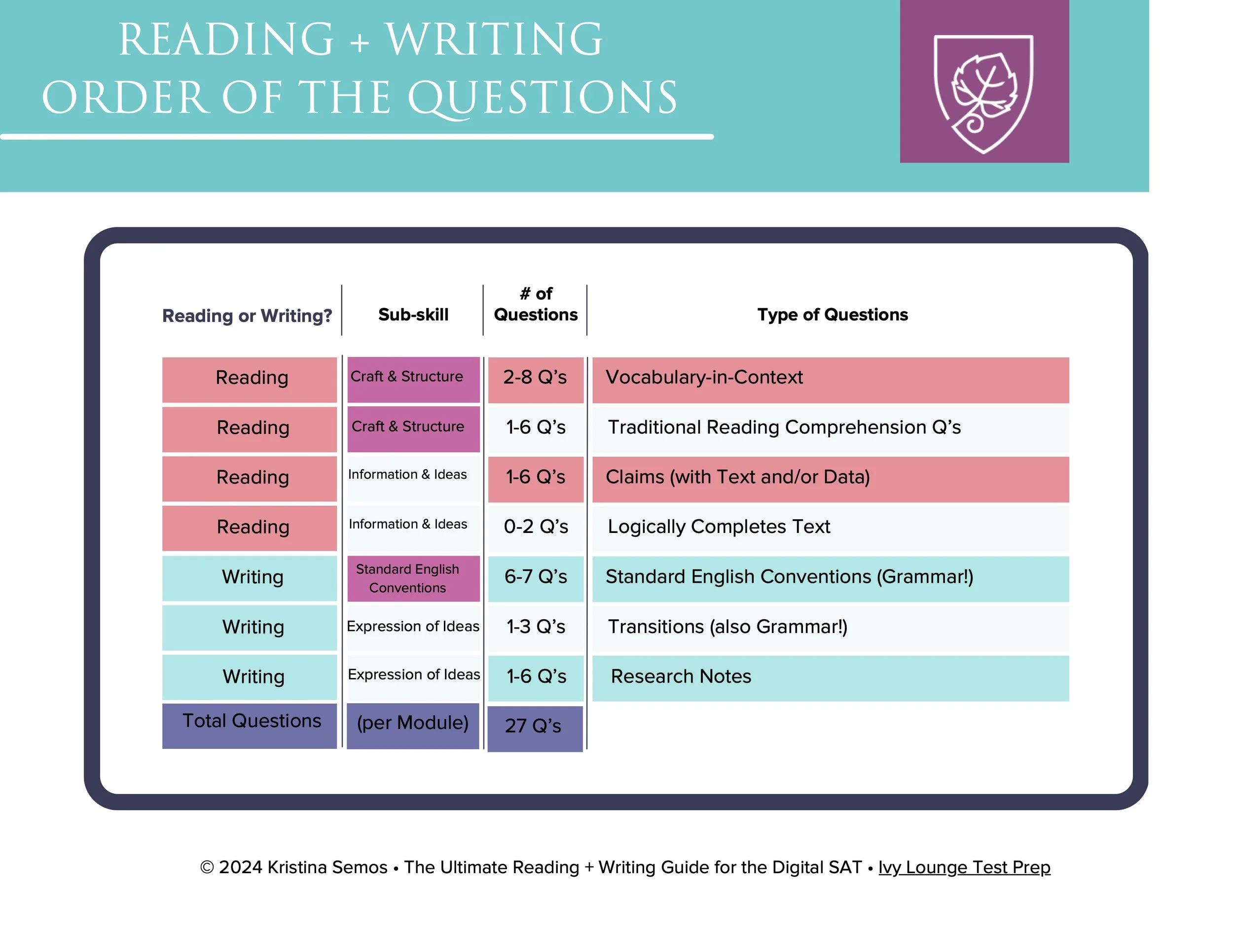If you’ve taken the Digital SAT once or twice already, you might have noticed something odd happening in the middle of the Reading and Writing section. A number of my private tutoring clients have reported suddenly feeling burnt out in Module 2 of that part of the test.
Whether it’s fatigue, an anxiety spike, or a lack of focus, their brain just can’t seem to keep cranking at full speed when it gets to R&W Module 2. And that’s a real problem in the SAT, where time is money (er, points)!
It’s my job to help my clients clear hurdles like this so they can get the very high scores they’re capable of. So, I’ve developed a hack for R&W burnout, and today I’m going to share it with you, too.
ARTICLE CONTENTS
1. Watch this article as a video
2. What does burnout in Reading & Writing module 2 look like?
3. Why you get so tired during the second R&W module
4. My hack for maintaining your focus throughout R&W module 2
5. Why this method will improve your score
6. Conclusion
Video version of this post:
Fatigue in Reading Writing Module 2
When you're tackling the Reading and Writing section of the Digital SAT, you’ll first proceed through Module 1, which comprises 27 questions. If you’re like most well-prepared students, you’ll still be feeling pretty good by the end of that section. You might even think to yourself, “Why does everybody make such a big deal about how hard the Reading and Writing section is? This test is awesome!”
That’s because in Module 1, the passages aren’t very long or complicated. You can zip through all of them and keep your energy high. Granted, the questions are discreet. So you're changing tasks every question, and that might start to erode your energy a little bit as you get decision fatigue. But your pre-test coffee is still surging through you. And so you do well anyways.
In fact, you do so well that the computer probably decides to assign you the harder option for R&W Module 2.
All of a sudden, things feel much tougher. Every passage seems to be twice as long, and/or twice as complicated as they were in Module 1.
Maybe the passages are drawn from older texts, with archaic vocab and twisty syntax to match. One passage might be talking about very niche scientific terms that you've never heard of, and you spend a lot of energy and time just trying to pronounce and parse them correctly in your head…causing you to lose the logic of what the sentence was even saying to begin with. Then the next passage jumps to some historical figure or event from a culture you’re not familiar with. There are a bunch of proper nouns—people's names, places, etc.—that you've never heard of before. It’s intimidating.
To make matters worse, you're starting to get tired. And you're starting to feel intimidated. You’re thinking to yourself, “I have no idea what I'm reading. How am I supposed to figure out what the function of this underlying sentence is?” Or, “How am I supposed to weaken this claim?” You feel like you can barely even keep your eyes open ‘til the end of the passage.
Plus, after all of that reading, there’s the rest of Module 2 to account for. You still have grammar questions, aka Standard English Convention questions. Then you have Transition Words. And then, finally, you have Research Notes questions. Normally, you do great on these three categories because they’re pretty much “what you see is what you get.” They're straightforward, they’re rules-based. But your focus is drifting. And as you finish Module 2, you find yourself thinking, “I really don't understand what just happened here. I may have totally bombed that second module.”
The thing is…maybe you’re right. Maybe you really did tank and get half the questions wrong. And now your score is much lower than we all know it could have been.
That would suck.
It did suck for some of the students who I was working with this past semester. And I wasn’t going to let that stand.
So I figured out a solution for them. And now I'm going to tell YOU how to get through the scenario of the Reading & Writing Module 2 from hell with your high score intact, should the dreaded mid-section crash hit you!
Why you get so tired during the second RW module
Now that we've identified WHAT we don’t want to happen to you in the second R&W module, I’m going to explain why this issue crops up…so that we can fully understand what you’re going to do to ensure the bad outcome doesn’t come to pass.
We must first understand how the module is structured. I'm going to show you exactly where the problem areas are in this part of the test.
Here’s a handy chart I made to lay out the order of the question types within the section. (This image is taken from my complete guide to the Reading & Writing on the Digital SAT, btw, where you can get loads more helpful infographics just like this, as well as time-saving tricks!)
Even though the questions might seem to come at you in a random fashion, with no apparent method to the madness of which question types appear when, that’s actually not the case. Their order is predetermined. And when you know that order, then you can make much more informed decisions about how you approach each question.
As you can see, you first start out with reading questions, then progress to writing. But that’s not all there is to it. Within each of those two categories, we also have what I call blocks of questions. For each of those blocks, there's going to be a different number of those questions in each module (2-8 Vocabulary-in-Context Qs, etc.).
We can never predict exactly how many there will be. But what we DO know is that once we’re done with question type A and have moved on to question type B, we have definitively finished question type A for this module. So once you’ve completed all of the Vocab-in-Context Qs and moved on to what I call the Traditional Reading Comprehension Questions, then you won't see another Vocab-in-Context Q in this module. Et cetera.
So here is the issue. Now that you understand the order in which these questions appear, I can tell you that the ones that are going to tire you out the most will crop up in these three blocks:
The Traditional Reading Comprehension Questions,
The Claims Questions,
and the Logically Completes Text questions.
Again consulting our handy chart, we can see that these three blocks of questions could consist of as many as 14 of your questions (it would never be as low as 2). Chances are it's gonna be a big chunk—possibly a third to a half of this whole module are going to be very text-dense, featuring more sophisticated sentences and sentence logic, words you don't know, and especially niche or proper nouns that involve unfamiliar scientific concepts, cultures, or names. This is all going to scramble your brain and wear you out.
This is WHY you are getting tired at this point in the R&W section….if you do things in the order that they are asked. The three toughest sub-categories of the module are all back-to-back.
So even when you make it to Standard English Conventions, Transitions, and Research Notes—question types that you might normally ace—now you're messing up some of those, too, because you’re so fatigued from pushing through the heavy-hitter question types all in a row.
It’s like trying to walk up a tiny hill after climbing Everest: it’s not that the hill is hard in and of itself—it’s that you’ve got nothing left in the tank.
Reading section energy hack
Now I'm going to tell you the crazy-simple tweak that you can make to give yourself a second wind…so you don't have to completely drag an unwilling and mistake-prone brain through the middle and end of this module.
If you’re like most Digital SAT-takers, you know that you tend to get really tired and unfocused in module two, right around the middle of the module. And then you struggle for time through the rest of the module. So what we are going to do is switch up the order in which we answer the questions in module 2.
Laid out as a plan of attack, here’s how you’re going to slay the Reading & Writing part of the test…without crashing in the middle:
Proceed through Module 1 as usual. Answer all of the questions, in order. Things are going great.
When you get to Module 2, instead of starting with the Reading questions—which would be the default order in which the test shows them to you—you are going to start with the Writing Qs.
If you don't know exactly where the Writing questions begin, jump to approximately question 15, give or take. If you go to question 15 and you're still being asked Reading questions (Logically Completes, etc.), then you're going to skip ahead and to question 16 or question 17. Skim these until you find your first Writing question, which should be a Standard English Convention (grammar) question.
Now, if you jump to question 15 and it’s already a Standard English Convention Q, then you're going to go back to question 14 or 13. You are going to keep jumping back until you bump up against the Reading questions and thus know for sure where they ended.
Wherever the grammar/Writing questions begin, that’s where you’re going to start this module. You are going to complete all of those grammar questions, in order.
Then you are going to keep going forward, in order, to Transition Word questions. Same goes for Research Note questions.
Once you are done answering all the writing Qs, then you're going to go back to the very beginning of the module and tackle those Reading questions (Sentence Completions will be the first block). After that, you’ll continue in order with the rest of the Reading questions: Traditional Reading Comp, then Claims, then you’ll finish out with any Logically Completes questions.
Why this method will improve your score
Here is why this new approach is working wonders for my students who are in the exact same boat that you are.
When you embark upon Module 2, you are, by definition, no longer as fresh as you were when you started Module 1. The natural fatigue of test-taking is setting in, even if you don’t notice it yet.
But if we can just give our minds a breather from the complicated, difficult stuff—by tackling some slightly easier, more straightforward questions instead, for a few minutes—you will regain some of your energy, or at least not lose any more at an accelerated rate.
After the mental break of a few Writing questions, when you restart at the beginning of Module two and proceed through the tougher Reading questions, you’re still going to get fatigued at some point—but it will take a little longer to set in.
And bonus points, if you run out of time or things start to get really hairy for you and you're not able to focus anymore, guess what? The ones that you're gonna mess up on will probably be the tricky Claims questions or maybe the Logically Completes…which are the problems that you’re likelier to have missed anyway. So no harm, no foul.
Conclusion
I’m super excited for you to try this little tweak because it can save you massive amounts of energy, focus…and points.
If you want even more help, check out my free training on the three biggest mistakes to avoid on the Digital SAT's Reading and Writing section. Or learn more about working one-on-one with me. I’ll develop an efficient study plan that caters to YOUR specific weaknesses and strengths.







